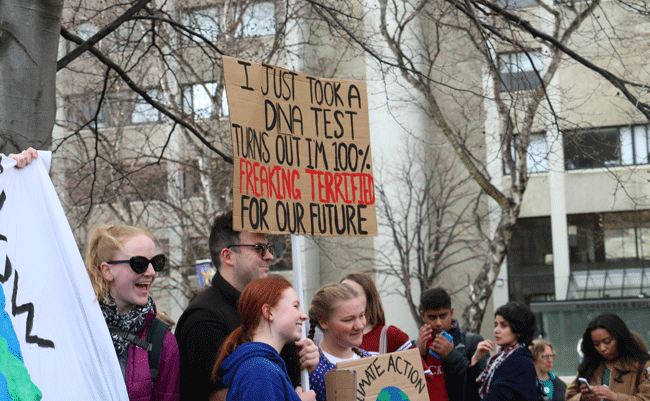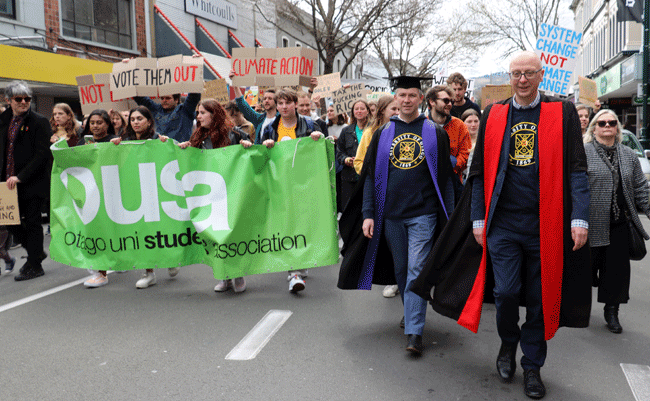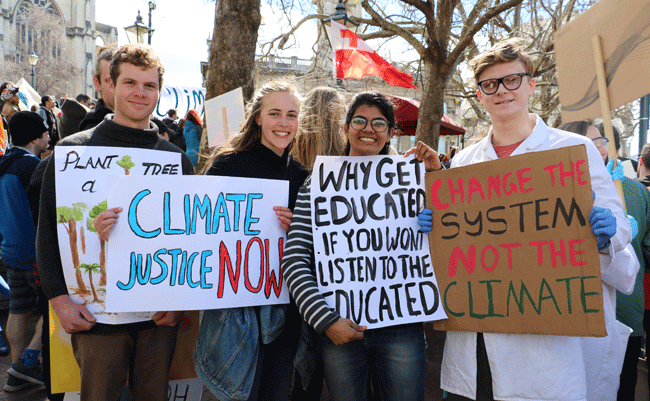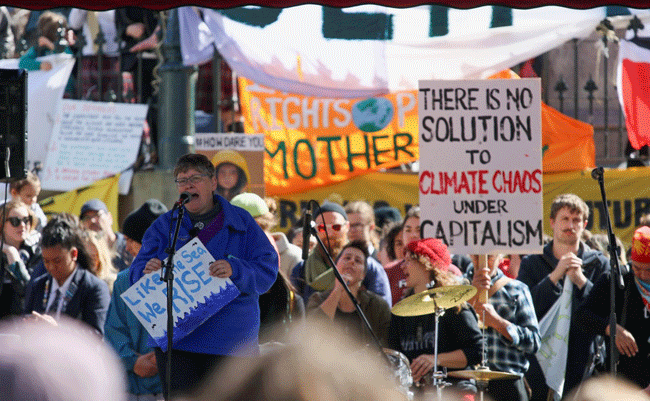Monday 30 September 2019 11:57am

University students and staff gathered on campus to march to the Octagon as a part of the Strike 4 Climate march on Friday.
Staff and students from Otago joined together with school pupils to call for action in relation to climate change during the Strike 4 Climate last Friday.
Members of the University community joined the Otago University Students’ Association, Te Roopū Māori and the Pacific Island Students’ Association on the Union Lawn to march together to the Octagon with school pupils and the wider community.
Pro-Vice-Chancellor Humanities Professor Tony Ballantyne and University Council member Shane Montague-Gallagher represented the Vice-Chancellor and senior leadership of the University.
Professor Ballantyne says the University sees climate change and questions of sustainability as fundamentally important.
“We support the call of the School Strike 4 Climate to address the urgent challenges posed by climate change. These are a truly global set of issues, but we recognise that climate change poses particular risks here and in our broader Pacific region.”
Professor Ballantyne says it was fantastic to see the commitment of our students and staff who participated.
“The University is deeply-committed to sustainability and to tackling the challenges posed by profound environmental change. Researchers from across the University are undertaking important work on climate change, environmental management, and sustainability, generating vital new knowledge that will help us to address these problems.”

University Council member Shane Montague-Gallagher and Pro-Vice-Chancellor Humanities Professor Tony Ballantyne represent the University at the Strike 4 Climate.
In a range of programmes and courses, University staff are introducing students to the latest research, to cutting-edge ideas, and the economic, political, social, and ethical dimensions of climate change issues.
“The University is facing these challenges.”
In 2018 Otago became the first New Zealand university to commit to pursuing the United Nations’ Sustainable Development Goals. The University is guided by its Sustainability Strategic Framework and is working hard to ensure that it adopts the principles and practices of sustainability in the daily life of its campuses, Professor Ballantyne says.
“There is more work to do and we hope to draw upon the expertise of our staff and students to continue to make positive strides. We recognise the need for real change that is at the centre of the School Strike 4 Climate.”
Hundreds of University students marched from the Union Lawn to the Octagon with school students, University staff, Otago Polytechnic staff and students and general strike supporters.
Zoology Master’s student Megha Sethi says participating in the march was empowering and the solidarity shown inspired her belief that people coming together could help to solve the climate crisis.
“The power lies in the masses and this is how we will bring change – together.”

Otago students joined thousands of others in the Octagon.
While the hundreds of people gathered in the Octagon was inspiring, Miss Sethi says the worldwide movement is a sign of the enormity of the world’s population who are calling for change.
“We are the future and so we will be the ones that save our planet. We’ll live sustainably so that more generations can survive on our planet.”
While the Strike 4 Climate involved many staff and students from the University, there were other activities organised by departments on the day.
Professor Abby Smith, of Marine Science, organised a march themed ‘Like the Sea, We Rise’ to coincide with the Strike 4 Climate, which involved staff and students from the department who followed the 1865 shoreline and met up with the strike.

A group "providing a voice for the ocean" on its way to meet the protest in the Octagon.
Professor Smith says there can be no question of the threat facing the ocean, with marine climate change causing warming waters, sea-levels rising, algal blooms and die-offs, and ocean acidification.
The ocean covers 71 per cent of the earth and contains 90 per cent of living species. It also produces 90 per cent of the oxygen we breathe, she says.
“There’s no question a healthy ocean produces a healthy planet and vice versa.”
Professor Smith says the students involved in the march were providing a voice for the ocean.

Professor Abby Smith addresses the crowds in the Octagon. Photo: Kane Fleury.